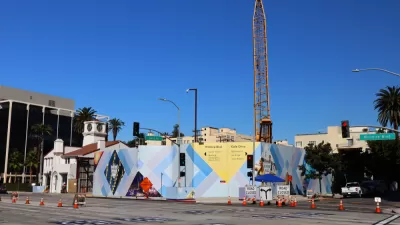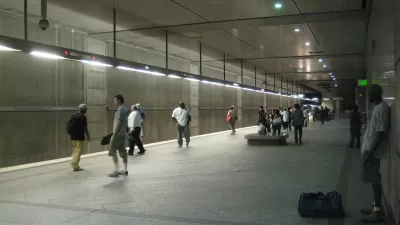Taras Grescoe examines how public transportation in the United States is gaining popularity and riders, but still lags in funding.
Taras Grescoe hears all sorts of opinions when it comes to public versus private transportation. Some see subways as cars for plebeians or "greener-than-thou zealots." Others see car commuters as selfish and "society-phobic individualists." The consistent fact he does find is the trend that people aren't using cars as much, especially younger drivers. In fact, "almost half of those aged 16 to 24 say they would choose Internet access over car ownership." Whether it's due to expensive gas or unbearably congested traffic, "across North America, transit ridership is skyrocketing."
While public transportation is becoming more popular, it's not going phase out cars any time soon. Even city residents who commute daily by subway still use cars for longer trips and for carrying big loads. In addition, federal funding favors roads and car networks to public transit systems. Grescoe notes that, "freeways...received $52 billion in federal funding in 2010, while Amtrak, in spite of record ridership, limped along with $1.5 billion in subsidies."
Ultimately, Grescoe finds that all types of transportation are useful. "[E]very subway-rider hails a taxi now and then, and even hardcore motorists find themselves longing for a bike ride in a park or a stroll on a plaza. In the city, everybody goes multi-modal."
FULL STORY: Return of the Straphanger Nation

Planetizen Federal Action Tracker
A weekly monitor of how Trump’s orders and actions are impacting planners and planning in America.

Maui's Vacation Rental Debate Turns Ugly
Verbal attacks, misinformation campaigns and fistfights plague a high-stakes debate to convert thousands of vacation rentals into long-term housing.

Restaurant Patios Were a Pandemic Win — Why Were They so Hard to Keep?
Social distancing requirements and changes in travel patterns prompted cities to pilot new uses for street and sidewalk space. Then it got complicated.

In California Battle of Housing vs. Environment, Housing Just Won
A new state law significantly limits the power of CEQA, an environmental review law that served as a powerful tool for blocking new development.

Boulder Eliminates Parking Minimums Citywide
Officials estimate the cost of building a single underground parking space at up to $100,000.

Orange County, Florida Adopts Largest US “Sprawl Repair” Code
The ‘Orange Code’ seeks to rectify decades of sprawl-inducing, car-oriented development.
Urban Design for Planners 1: Software Tools
This six-course series explores essential urban design concepts using open source software and equips planners with the tools they need to participate fully in the urban design process.
Planning for Universal Design
Learn the tools for implementing Universal Design in planning regulations.
Heyer Gruel & Associates PA
JM Goldson LLC
Custer County Colorado
City of Camden Redevelopment Agency
City of Astoria
Transportation Research & Education Center (TREC) at Portland State University
Jefferson Parish Government
Camden Redevelopment Agency
City of Claremont





























